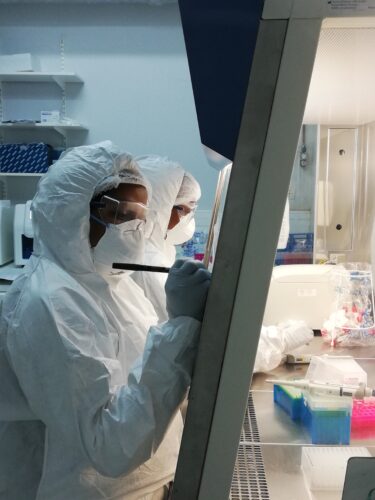Publication of a scientific article as part of the AFROSCREEN project: “Snapshot of Anti-SARS-CoV-2 IgG Antibodies in COVID-19 Recovered Patients in Guinea”
Publication of a scientific article as part of the AFROSCREEN project: “Snapshot of Anti-SARS-CoV-2 IgG Antibodies in COVID-19 Recovered Patients in Guinea”

Covid-19 arrived in Africa in February 2020. Most African countries, however, having less developed health systems, had to limit testing to priority individuals such as the ill and those at risk. Compared with the rest of the world, the African continent has seen fewer severe cases and deaths due to COVID-19, accounting in November 2022 for 12.7 million confirmed cases and almost 260,000 deaths, representing just 2% of global cases.
In Guinea, the first case was detected in March 2020. By October 2023, 38,465 people had been infected and 468 had died, representing a case-fatality rate of 1.2%. The vaccination campaign began with limited doses of the Russian Sputnik V vaccine in late 2020, then expanded with Sputnik V and Sinopharm vaccines from March 2021.
Despite the late vaccination campaign, around two-thirds of the African population are thought to have been exposed to the virus and developed natural immunity. In Guinea, studies have shown a significant increase in antibodies against SARS-CoV-2, rising from 17.3% in December 2020 to 42.4% in June 2021. This immunity could be reinforced by previous exposure to other endemic coronaviruses. Nevertheless, some infected individuals developed few antibodies or saw their antibody levels decline rapidly.
From March 2020 to April 2021, the Institut Pasteur de Guinée tested over 21,000 patients, with 7,600 positive results. The teams then assessed patients’ natural immunity (IgG) against SARS-CoV-2 on a panel of 200 unvaccinated recovered patients using three different ELISA tests (commercial or “In-house” kits and targeting either nucleoprotein or Spike protein). Results were analyzed according to age, sex, clinical symptoms and duration of illness.
Covid-19 arrived in Africa in February 2020. Most African countries, however, having less developed health systems, had to limit testing to priority individuals such as the ill and those at risk. Compared with the rest of the world, the African continent has seen fewer severe cases and deaths due to COVID-19, accounting in November 2022 for 12.7 million confirmed cases and almost 260,000 deaths, representing just 2% of global cases.
In Guinea, the first case was detected in March 2020. By October 2023, 38,465 people had been infected and 468 had died, representing a case-fatality rate of 1.2%. The vaccination campaign began with limited doses of the Russian Sputnik V vaccine in late 2020, then expanded with Sputnik V and Sinopharm vaccines from March 2021.
Despite the late vaccination campaign, around two-thirds of the African population are thought to have been exposed to the virus and developed natural immunity. In Guinea, studies have shown a significant increase in antibodies against SARS-CoV-2, rising from 17.3% in December 2020 to 42.4% in June 2021. This immunity could be reinforced by previous exposure to other endemic coronaviruses. Nevertheless, some infected individuals developed few antibodies or saw their antibody levels decline rapidly.
From March 2020 to April 2021, the Institut Pasteur de Guinée tested over 21,000 patients, with 7,600 positive results. The teams then assessed patients’ natural immunity (IgG) against SARS-CoV-2 on a panel of 200 unvaccinated recovered patients using three different ELISA tests (commercial or “In-house” kits and targeting either nucleoprotein or Spike protein). Results were analyzed according to age, sex, clinical symptoms and duration of illness.